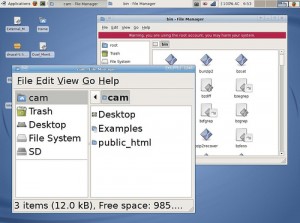So now the time has come to reinstall Ubuntu on my very first PC, and this thing will go from Ubuntu 8.04 with LXDE to Ubuntu 10.04 with LXDE.
But I’m going about things a little differently on this machine. First of all, when I tried to load the computer using the Ubuntu 10.04 Live CD, it wouldn’t boot all the way into a graphical environment. Fail.
I’ve read that the minimum RAM requirement to use an Ubuntu Live CD is 250MB. Well, that must not be the case for the latest version because my computer has 384MB and it wouldn’t boot.
So Plan B. Xubuntu 10.04. The Live CD booted fine, albeit very slowly. But once it did, I had to do a little bit of messing around with GParted again.
Back when I had installed Xubuntu 7.04 on it, the swap partition had been set to about 320MB – twice the size of the RAM, which was 160. I had since upgraded the RAM to 384 (maxed out) and reinstalled different versions of Ubuntu on that thing. It saw Fluxbuntu 7.10, the same thing with LXDE on top, and Ubuntu 8.04 with LXDE on top. But none of these installations had ever enlarged the swap partition to where it should be. So I embiggened it to around 2x of 384MB and started up the installation application.
Xubuntu uses the same installation app as Ubuntu. I think it’s called “Ubiquity”. Anyway, on my very old first computer with it’s little Pentium II at 266MHz chugging away, each screen takes about 2 to 5 minutes to load off the Live CD once “OK” is clicked. So I played some video games while I did that. I’m kicking ass in Age of Empires and Lords of the Realm II right now.
At first I was going to just wipe the previous installation of Ubuntu off the 10GB secondary IDE HD, but as I looked at the installer’s nicely laid out info about my drives, I decided to install 10.04 to my 16GB flash drive. I figured I could speed up my OS a little and give the aging hard disks a break.
I did a little research on the net, which included an amusing post on Reddit. I learned that ext2 is a non-journaling filesystem, and as such is better suited to flash drives because of the lack of writes it utilizes compared to journaling filesystems like ext3 and ext4.
I also learned of Linux filesystem attribute called “noatime”. When a partition is mounted to a Linux OS with “noatime”, records aren’t made about the last time a file was accessed, as happens in most cases with most setups. That means a big speed and performance boost, but also less security and a reduced ability to recover the filesystem from errors. Since I only use that computer for reading, that doesn’t matter to me.
I also learned that as long as one of a system’s drives has a swap partition, it will be used by whatever Linux OS happens to be running. That’s also good because swap partitions get written-to constantly, and you don’t want that with a flash drive.
So off I went, installing Xubuntu 10.04 onto my ext2 formatted 16BG flash drive. Plugged into a USB 2.0 PCI card that my Windows 98 installation can’t even detect, I might add. The same PCI card enables the USB 2.0 ethernet adapter, but I digress. The installation process itself takes about 2 hours on that computer. It hasn’t gotten any faster since I first did it back in 2007.
Once it was done, I needed to take a look at some things in GParted, so I selected “no” to the prompt to reboot now. Then once I tried to reboot, the Xfce panel crashed on me and I had to run it again to use it to logoff. I thought that this had caused a problem, because on reboot, I saw the CD drive light going crazy and a GRUB2 error message that a certain drive (bu UUID) could not be found.
So I reinstalled GRUB2.
That didn’t work either. Let me rephrase that. That didn’t fucking work either. Fuck.
So I did what any sane geek would do, and I repeated the entire install process over again. And I continued to play Age of Empires and Lords of the Realm II. I’m still handily winning both games.
And now, as I write this, I find that regardless of the Xfce panel crashing on reboot and everything going smoothly, I still can not boot my system at all. So I am currently reformatting the flash drive to FAT32, backing up my data from the 10GB HD again to it, and installing Xubuntu 10.04 to the 10GB HD like I planned all along. So much for the flash drive experiment.
I had thoughts earlier of taking that rather loud 10GB HD out and replacing it with a rat, I mean replacing it with a 40GB IDE HD, but I realized that the process of doing that would take at least two hours. In hindsight, I spent 4 fucking hours accomplishing absolutely nothing, so maybe I should have just done that.
Meh.
Anyway, I think it’s a good time to mention that I have found a better way of getting stuff onto a flash drive from a hard drive while using a Live CD. If you just try to go all copy and paste in the file manager, it won’t let you do it because you don’t have permission. You are the user, and the drives belong to “root”.
I used to fuck around with changing the permissions, which involves typing out, among other things, “chmod” and some numbers (like 666 or something, and I’m not kidding) into a terminal window.

But my new preferred method is much easier. I still have to use a terminal window, but now all I type is:
sudo thunar

Or “sudo nautilus” or “sudo pcmanfm”. That opens up the file manager (whatever it may be) as “root”, which means you now call the shots, Bucko.

And this is you before you opened the file manager as root:

Okay, so now I’m just babbling and making horrendously stupid jokes. But that’s what this blog is for!
And good Gord it’s taken me a long time to write all this. That’s because I started writing at a point when I wasn’t sure if my 2nd flash drive installation would fail, like it did. Right now, the installer is actually off and running again, and I’ve decided to try ext2 on the HD instead of ext4. That computer doesn’t have any data I want to keep on it, and without journaling, I will probably see a speed increase. I also want to try using it with “noatime” to see how that effects speed. Coupled with the fast boot time I’ve seen with a fresh install of 10.04, I should see that old computer running Linux as fast as it ever has.
I’m sure you’re holding your breath in anticipation, so I’ll let y’all know all about it next weekend when I have time to actually use the thing again.
